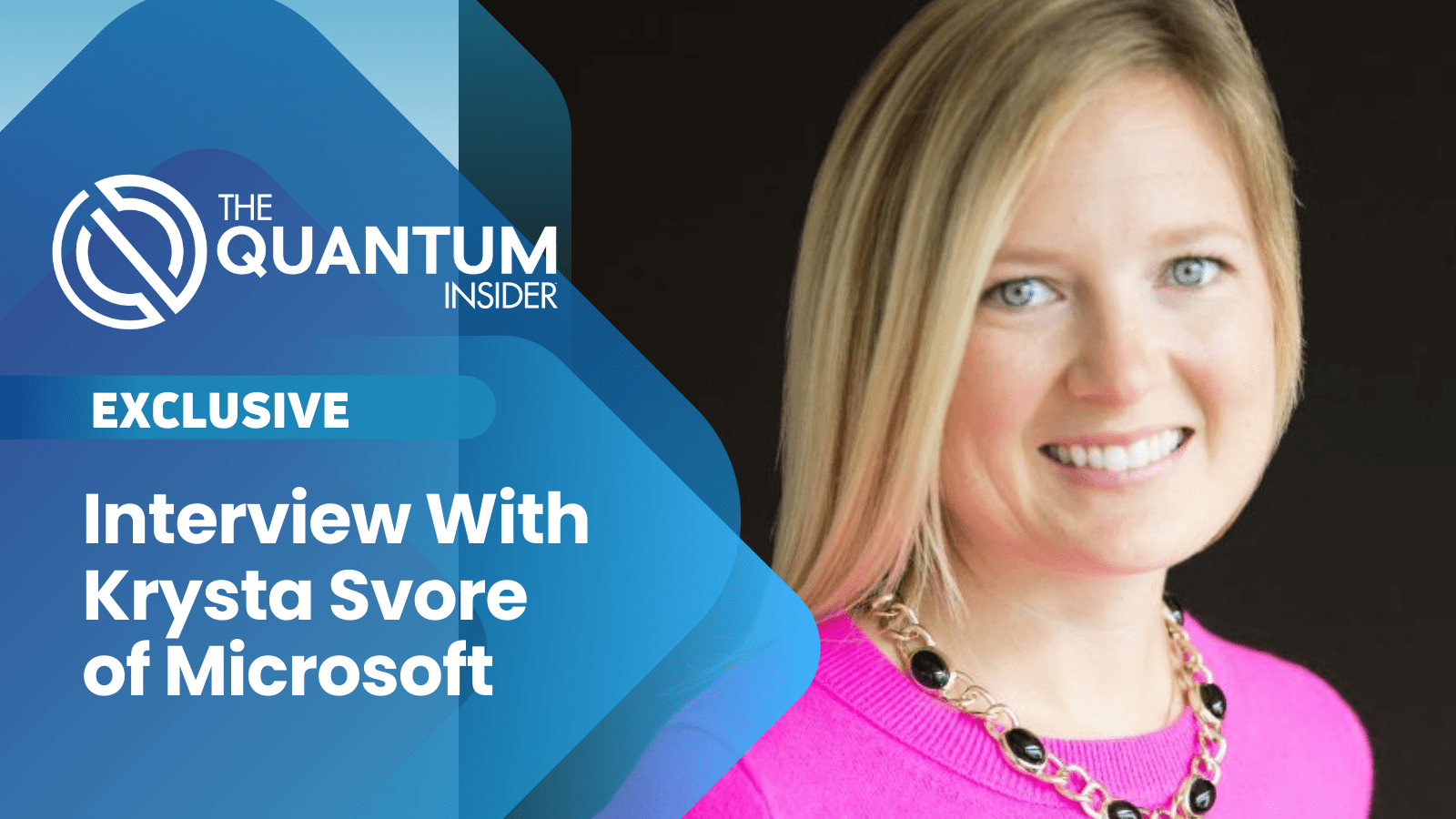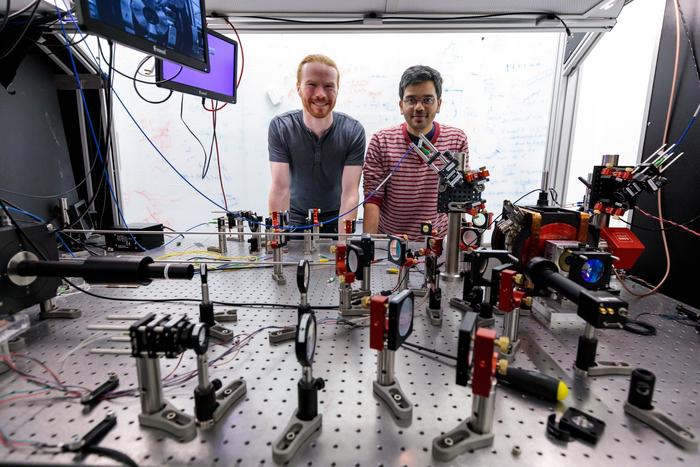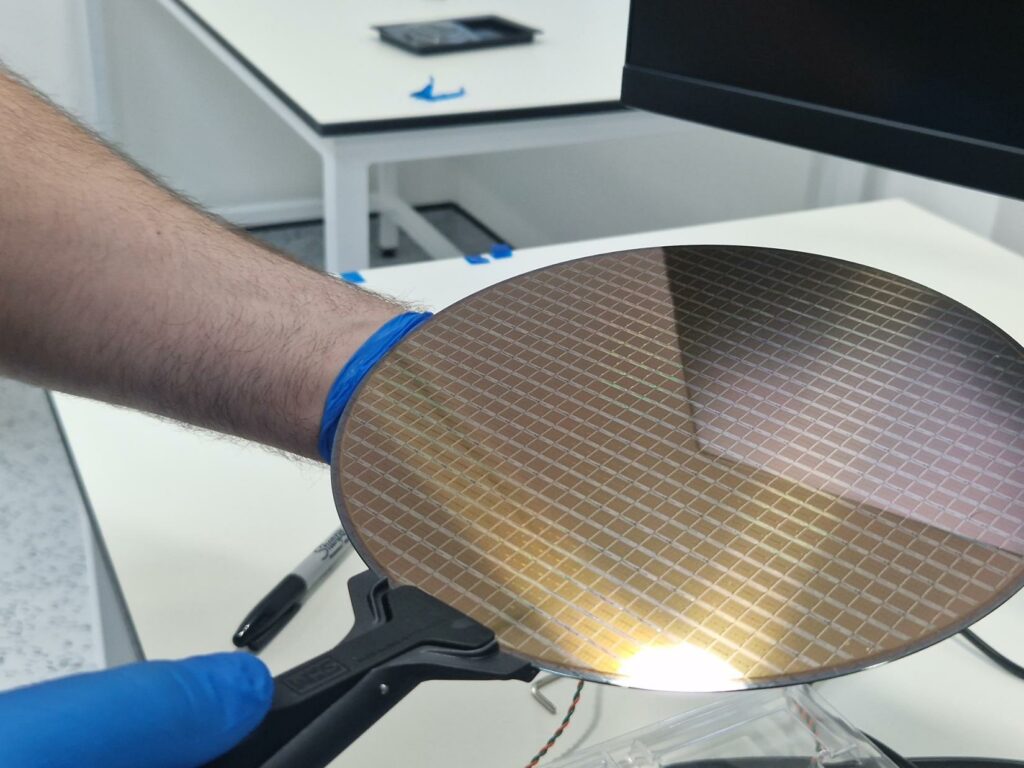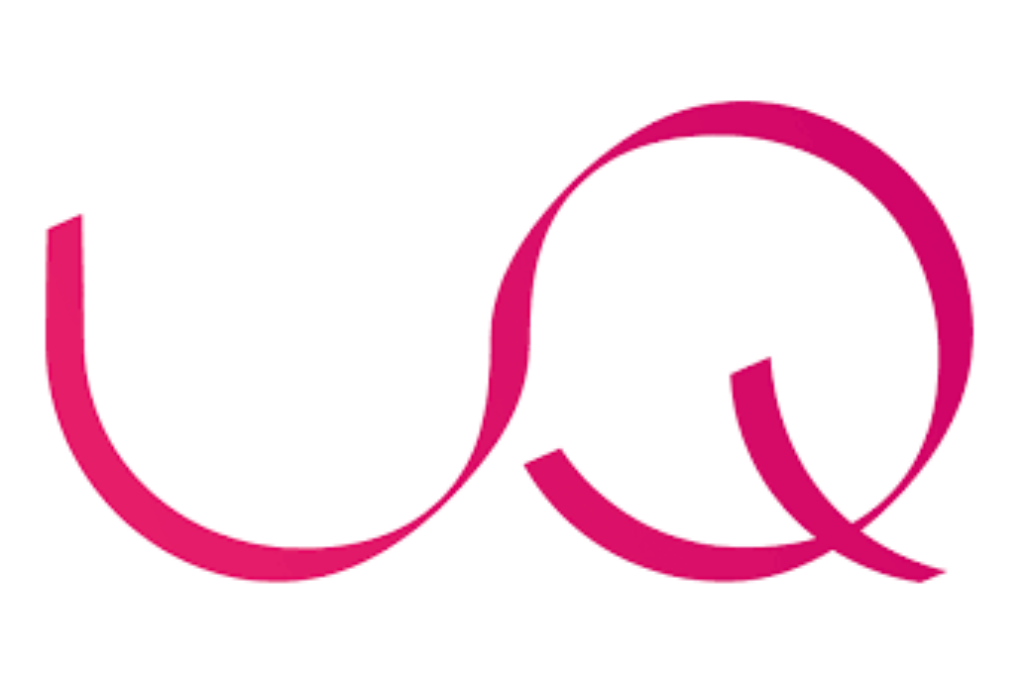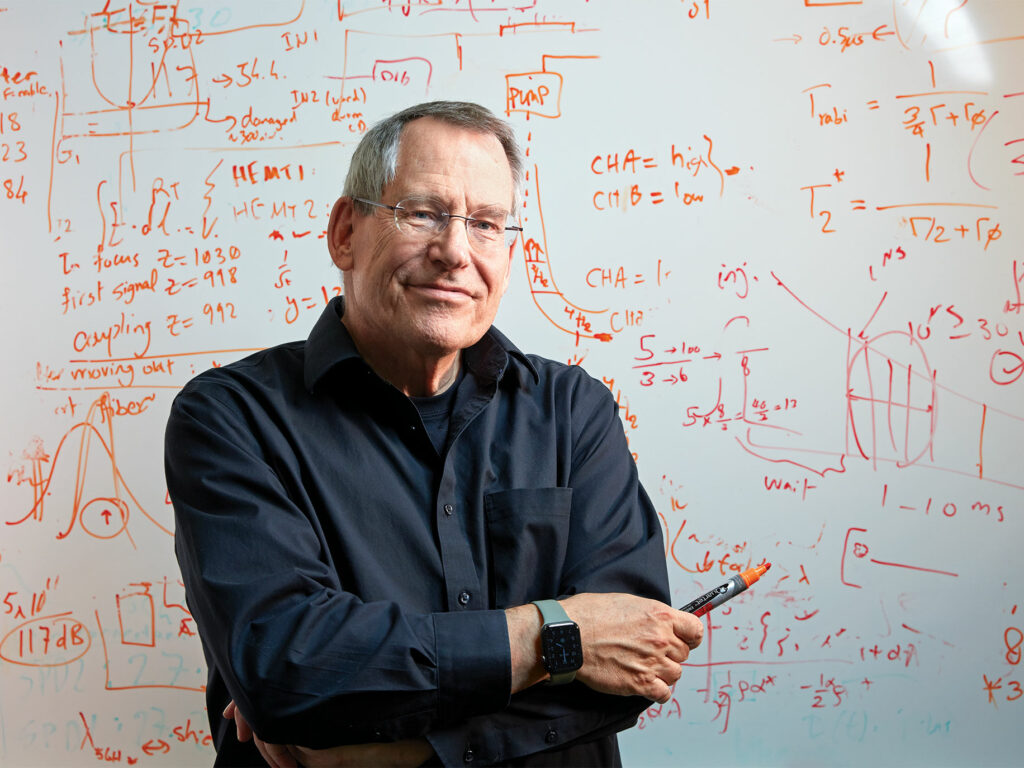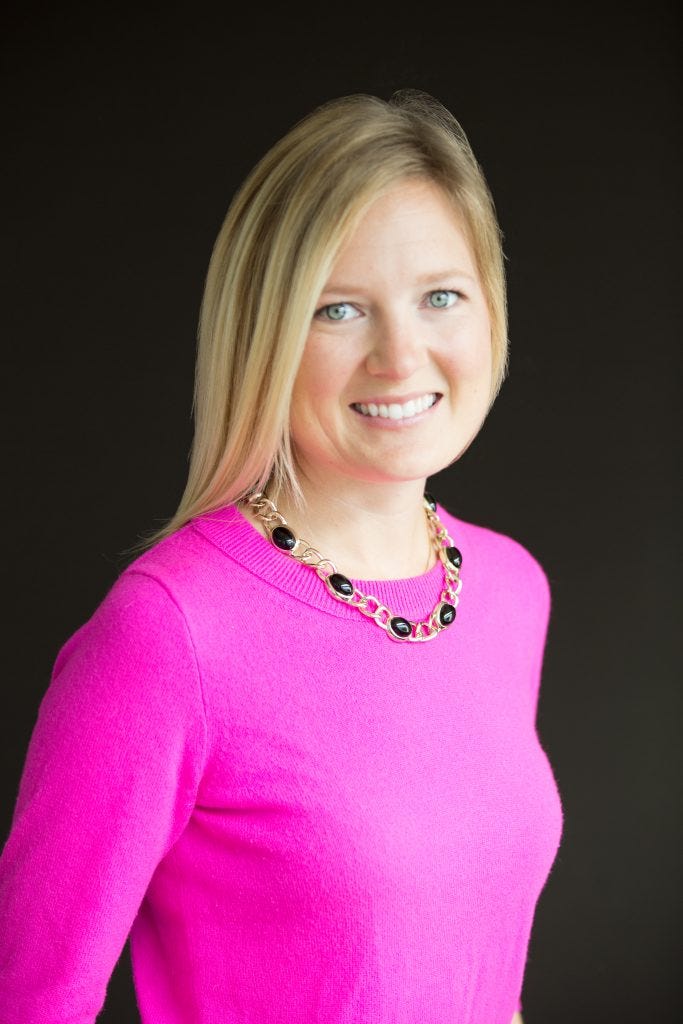
Herculean Challenges
At the beginning of Krysta Svore’s keynote speech at The Economist Impact event in London this May, the “Distinguished Engineer” and VP of Quantum Software at Microsoft began by talking about the magnitude of challenges her daughter and others of her generation are about to inherit:
Saving the oceans.
Saving the planet.
Feeding a global population…
These, she said, will be Herculean challenges.

Yet, as a scientist, Svore is confident science will find a way.
She believes — like many in the audience including The Quantum Insider’s representatives — in a Quantum Future, a future that will “graduate from qubits to profit” and make the world a better place.
While Svore’s keynote was enlightening, it was during The Quantum Insider’s private interview with her that we got to ask some really interesting questions.
Svore began by saying Microsoft’s quantum program Azure was fully focused on unlocking solutions to challenging problems.
Elusive Physics
“First and foremost, what we’ve done is invest in quantum computing — from the machine to the software to the algorithm. From the beginning, we’ve thought about what can this be used for,” said Svore, highlighting the importance of architecting a complete stack.
Svore then explained that over the last few months Microsoft has demonstrated a key component of this by showing on a series of devices “elusive physics” that builds the groundwork for this foundation for scaling up a quantum machine.
This is achieved by creating and sustaining a quantum phase with Majorana zero modes and a measurable topological gap removes the biggest obstacle to producing a unique type of qubit, called a topological qubit. This groundbreaking work was published in a Microsoft blog post back in March.
Part of Microsoft’s strategy has not only been directed towards investment in the hardware and software stack but in its cloud platform, Azure, too.
“We have Azure Quantum, which is a platform for performing quantum research and discovery. We need more people building applications. We need more people building quantum machines. We have a diverse set of machines available at Azure Quantum through a single cloud service, through a single set of code,” said Svore.
We then asked Svore whether the building out of Microsoft’s full-stack capabilities was part of a risk management strategy. If their approach to building useful quantum computers doesn’t work, they will still have capabilities across the quantum technology stack.
“I don’t see it as risk management; I see it as essential,” she began. “When you think about the machine, you also want to co-design that machine with the software. We’re developing the algorithms, the software layers, the compiler stack, the run-time, and the machine. Now, many elements of those you can make hardware agnostic — and that’s a good thing… That’s good stack design.”
The focus then moved to an end state, where Microsoft sees access in the value chain for end-users of its product stack: Svore sees that Microsoft’s strategy — which is already happening — is one where quantum computers are seamlessly integrated into the cloud, though she admits that currently, the machines aren’t yet at scale to run large instances.
The World’s Computer
“Ultimately, said Svore, “it’s very hybrid. And at Microsoft, we’re building Azure. Azure is the world’s computer and whether it’s running GPU, CPU or QPU — all of these options underneath — you just want to make sure it can run and solve your problem. And from an end-user perspective, I just want the best capability. Microsoft wants to empower the world with the best compute capability.”
“With Azure Quantum we want to democratize quantum. We want to build that “quantum app store”. And you can start engaging with that now.”
Svore also declared a call to action for enterprises, users and developers to migrate to the quantum cloud if they haven’t already done so, but — at the same time — continue using the classical tools they “know and love”, as Svore believes classical programs, tools and apps will never be fully replaced by quantum, but enhanced, accelerated and augmented by the new technology.
Another problem we put to Svore in regard to roadblocks in the successful adoption of quantum across the board is the frustrating situation where the industry doesn’t have the underlying quantum hardware to test the efficacy of the newly designed algorithms.
“We would love to be able to prove algorithms are going to be better on a quantum machine — and in some cases, you can prove these types of things, and that gives us quite a bit of certainty,” Svore began. “We can see this across the molecular sciences, chemistry and material science, that’s where we know there are very strong electron correlations that are very hard to model on a classical machine. A quantum machine plays a key role here.”

Then, on the flip side, Svore noted the explosion of mobile apps and devices like the Apple iPhone because of the opening up of development kits to the world.
Azure, she said, is making this possible:
“With Azure Quantum we want to democratize quantum. We want to build that “quantum app store”. And you can start engaging with that now.”
The conversation shifted to that most sensitive of topics, money, and where and how it will be generated in the space.
Money Talk
“I tend to focus less on revenue on the market right now and focus more on generating the discovery,” said Svore.
She admits there is money to be made in the market and that this will inevitably grow, but with the added caveat that only if “we make progress”.
For Microsoft, engagement is important. Although revenue is a nice thing to have, ultimately the company’s goal is to drive the technology forward, Svore said. And with a healthy balance sheet and plenty of cash in the bank, Microsoft can afford to do so.
Microsoft’s offering is certainly compelling. With Svore at the helm, its world-class team of quantum specialists in hardware, software and algorithm design, Svore’s daughter and her generation are definitely in good hands to enjoy the world for many years to come.
Learn more
Dr. Krysta M. Svore is a Distinguished Engineer and VP of Quantum Software at Microsoft where she leads work on the software stack for Microsoft’s quantum machine and Azure Quantum cloud platform. Dr. Svore’s research focuses on the development and implementation of quantum algorithms, the design of a scalable, fault-tolerant software architecture for translating a high-level quantum program into a low-level, device-specific quantum implementation, and the study of quantum error correction codes and noise thresholds. She has also developed machine-learning methods for web applications, including ranking, classification, and summarization algorithms.
Dr. Svore received an ACM Best of 2013 Notable Article award. In 2010, she won the Yahoo! Learning to Rank Challenge with a team of colleagues. She was a keynote speaker at CRA Snowbird Bi-Annual Conference 2014 and 2014 APS March Meeting Quantum Session. She received her Ph.D. in Computer Science with the highest distinction from Columbia University in 2006. Dr. Svore is Kavli Fellow of the National Academy of Sciences. She serves as a representative for the Academic Alliance of the National Center for Women and Information Technology (NCWIT) and is an active member of the American Physical Society (APS) and the Association for Computing Machinery (ACM). Dr. Svore has published over 40 refereed articles and has filed over 20 patents. She also currently serves as the Chair of the Board of Trustees at Forest Ridge School of the Sacred Heart in Bellevue, WA.
For more market insights, check out our latest quantum computing news here.


